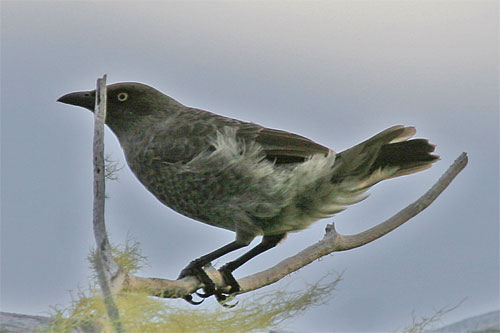| Line 1: | Line 1: | ||
| − | |||
;Aplonis cinerascens | ;Aplonis cinerascens | ||
[[Image:RarotongaStarling3.jpg|thumb|550px|right|Photo by Marcus Lawson. Taken - Rarotonga, Cook Islands ]] | [[Image:RarotongaStarling3.jpg|thumb|550px|right|Photo by Marcus Lawson. Taken - Rarotonga, Cook Islands ]] | ||
| Line 6: | Line 5: | ||
==Distribution== | ==Distribution== | ||
| − | + | [[Cook Islands]]. | |
==Taxonomy== | ==Taxonomy== | ||
| Line 13: | Line 12: | ||
==Behaviour== | ==Behaviour== | ||
It is either alone or in pairs; its diet is nectar, fruit and insects. | It is either alone or in pairs; its diet is nectar, fruit and insects. | ||
| + | |||
The Rarotonga starling is a territorial bird, and it returns to the same nest to breed year after year. Eggs are laid between August and December. | The Rarotonga starling is a territorial bird, and it returns to the same nest to breed year after year. Eggs are laid between August and December. | ||
==External Links== | ==External Links== | ||
{{GSearch|Aplonis+cinerascens}} | {{GSearch|Aplonis+cinerascens}} | ||
| − | [[Category:Birds]] | + | [[Category:Birds]][[category:incomplete]] |
Revision as of 14:47, 15 November 2007
- Aplonis cinerascens
Identification
This bird has yellow eyes and a dark brownish-grey plumage with a pale area under the tail. The legs, feet and bill are black. Its voice is a whistling ee-oi, ee-oi call.
Distribution
Taxonomy
Habitat
Subtropical or tropical moist montanes
Behaviour
It is either alone or in pairs; its diet is nectar, fruit and insects.
The Rarotonga starling is a territorial bird, and it returns to the same nest to breed year after year. Eggs are laid between August and December.




